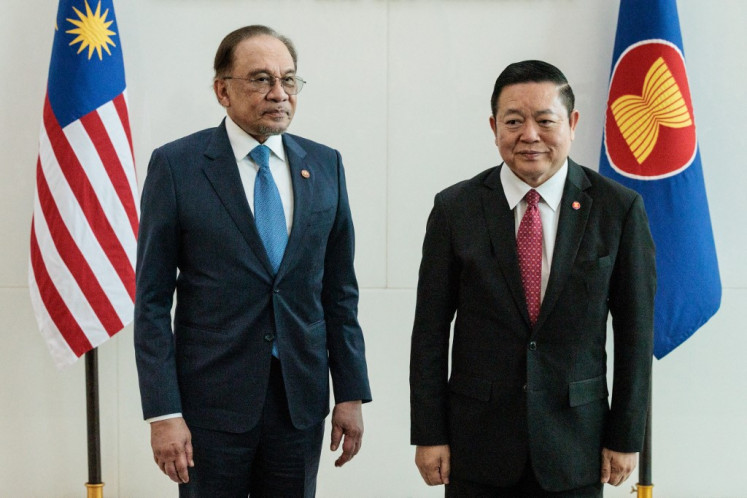Popular Reads
Top Results
Can't find what you're looking for?
View all search resultsPopular Reads
Top Results
Can't find what you're looking for?
View all search resultsSeveral regions urged to oblige use of Javanese in schools
Participants of the four-day Javanese Language Congress held in Surabaya, East Java, urged Javanese-speaking regions to issue a bylaw that obliges the use of Javanese in schools, in an effort to preserve the language among younger generations
Change text size
Gift Premium Articles
to Anyone
P
articipants of the four-day Javanese Language Congress held in Surabaya, East Java, urged Javanese-speaking regions to issue a bylaw that obliges the use of Javanese in schools, in an effort to preserve the language among younger generations.
The demand was conveyed during the last day of the congress on Wednesday. Some 600 participants from 12 provinces across Indonesia and 11 foreign participants from Suriname, the US and Australia attended the congress.
“We have been demanding the same thing since our last congress in Semarang in 2006, but the implementation was not completed. That’s why we’ve brought the demand back again this time,” Bonari Nabonenar of the congress’ recommendation team told The Jakarta Post on Wednesday.
Javanese is spoken mostly in Yogyakarta, Central Java and East Java provinces.
Preservation of the Javanese language, according to Bonari, is urgent because UNESCO has revealed that 169 out of 742 regional languages spoken across the archipelago are on the brink of extinction as they are spoken by less than 500 people in their respective environments.
“Unless something is done about it, the Javanese language will be extinct in few years,” Bonari said.
Bonari also said that the congress recommended the establishment of a Javanese language council at a regional administration level, tasked with preparing draft bylaws on the use of Javanese in schools and with encouraging teaching methods to make learning Javanese more fun for students.
A participant, Jumiyo Siswapangarso from Yogyakarta, said the Yogyakarta governor had once issued a decree on the use of Javanese in schools but that its implementation had been far from smooth, mostly due to a limited number of Javanese language teachers.
A similar story also occurred in Surabaya, which had since 2008 obliged students and teachers to speak Javanese in schools through the so-called Java Day program. It later turned out that only 10 percent of a total of 50 elementary to senior high schools in the municipality had implemented the program.
Andreas Novianti, a senior high school student in Surabaya, said that many of her friends preferred to learn English rather than Javanese because the former promised a brighter future.
Separately, lecturer Ayu Sutarto of Jember State University’s School of Literature underlined the important role of investors in the preservation of Javanese through the production and marketing of various products with Javanese language content.
“So far Javanese is only introduced through formal, informal and non-formal mediums, such as schools, families and communities. It’s now the era of mass media and investors can do so either through television programs, radio, newspapers, magazines or books,” said Ayu, who is also a permanent member of the Southeast Asian Literature Council.
Secretary of the congress’ organizing committee, Hisbul Wathon, said that the congress, in its fifth year, was expected to be a cultural protector for young generations against the impact of globalization.
“Hopefully, there will be goodwill from policy makers to help make Javanese more down to earth in Indonesia and a part of the local wisdom,” Hizbul said.
He expressed hope that the congress’ recommendations would be accommodated in the curriculum of elementary to senior high school education in Javanese-speaking regions.
The next congress will be held in Yogyakarta in 2016.










